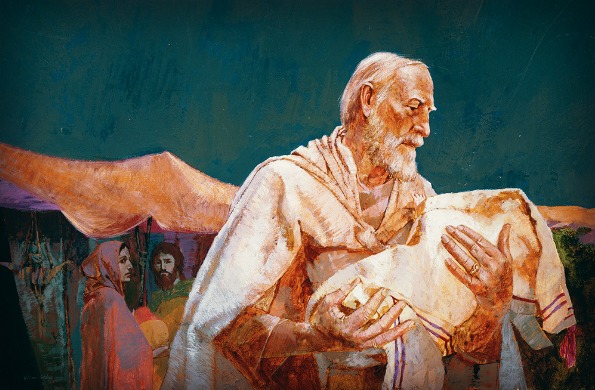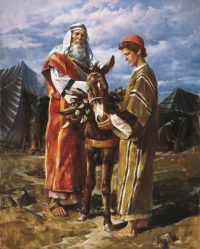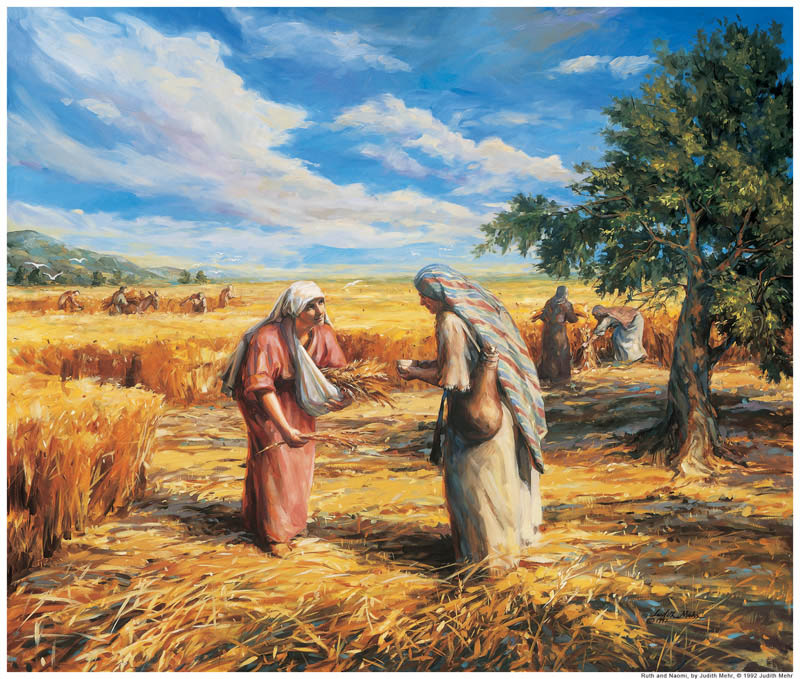Abraham of the Old Testament lived an extraordinary life. Born to pagans, Abraham still longed to follow the one true God, Jehovah. He wished to have the priesthood ordained upon him. Although knowledge of Adam and Eve and all that had transpired from the beginning of earth had been passed down, father to father, to Abraham’s father:
2 And, finding there was greater happiness and peace and rest for me, I sought for the blessings of the fathers, and the right whereunto I should be ordained to administer the same; having been myself a follower of righteousness, desiring also to be one who possessed great knowledge, and to be a greater follower of instructions, and to keep the commandments of God, I became a rightful heir, a High Priest, holding the right belonging to the fathers.
Abraham and Isaac
3 It was conferred upon me from the fathers; it came down from the fathers, from the beginning of time, yea, even from the beginning, or before the foundation of the earth, down to the present time, even the right of the firstborn, or the first man, who is Adam, or first father, through the fathers unto me.
4 I sought for mine appointment unto the Priesthood according to the appointment of God unto the bathers concerning the seed. Pearl of Great Price, Abraham 1:2-4
Sadly, Abraham’s father had turned from God and begun worshiping the gods of the Egyptians. Common to that day, and that pagan religion, was the sacrifice of men, women, and children unto these gods: Elkenah, Libnah, Mahmackrah, Korash, and the god of Pharaoh, king of Egypt. And true to this religion, the priests placed Abraham upon the altar and prepared to sacrifice him unto these gods.
12 And it came to pass that the priests laid violence upon me, that they might slay me also, as they did those virgins upon this altar; and that you may have a knowledge of this altar, I will refer you to the representation at the commencement of this record.
But Abraham was a man of faith and belief in his God, Jehovah.
15 And as they lifted up their hands upon me, that they might offer me up and take away my life, behold, I lifted up my voice unto the Lord my God, and the Lord hearkened and heard, and he filled me with the vision of the Almighty, and the angel of his presence stood by me, and immediately unloosed my bands;
16 And his voice was unto me: Abraham, Abraham, behold, my name is Jehovah, and I have heard thee, and have come down to deliver thee, and to take thee away from thy father’s house, and from all thy kinsfolk, into a strange land which thou knowest not of;
So Abraham was freed and removed from the reach of his father and those others who would slay him because of belief in Jehovah. In fact, Abraham was more than freed, the priest who tried to sacrifice him was killed.
Famine filled the land as a response to the widespread wickedness, but Abraham was pleased:
31 But the records of the fathers, even the patriarchs, concerning the right of Priesthood, the Lord my God preserved in mine own hands; therefore a knowledge of the beginning of the creation, and also of the planets, and of the stars, as they were made known unto the fathers, have I kept even unto this day, and I shall endeavor to write some of these things upon this record, for the benefit of my posterity that shall come after me. — Pearl of Great Price, Book of Abraham, 1:31
 The record of those writings are known as the Book of Abraham, translated by Joseph Smith, Jr. And in these writings we learn about the Abrahamic Covenant, given to Abraham. From the Bible Dictionary we learn we learn a little more about the Abrahamic Covenant:
The record of those writings are known as the Book of Abraham, translated by Joseph Smith, Jr. And in these writings we learn about the Abrahamic Covenant, given to Abraham. From the Bible Dictionary we learn we learn a little more about the Abrahamic Covenant:
Abraham first received the gospel by baptism (which is the covenant of salvation). Then he had conferred upon him the higher priesthood, and he entered into celestial marriage (which is the covenant of exaltation), gaining assurance thereby that he would have eternal increase. Finally he received a promise that all of these blessings would be offered to all of his mortal posterity (D&C 132: 29-50; Abr. 2: 6-11).
Included in the divine promises to Abraham were the assurances that1 Christ would come through his lineage, and that2 Abraham’s posterity would receive certain lands as an eternal inheritance (Gen. 17; Gen. 22: 15-18; Gal. 3; Abraham 2). These promises taken together are called the Abrahamic covenant. It was renewed with Isaac (Gen. 26: 1-4, 24) and again with Jacob (Gen. 28; Gen. 35: 9-13; Gen. 48: 3-4).
The portions of the covenant that pertain to personal salvation and eternal increase are renewed with each individual who receives the ordinance of celestial marriage (see D&C 132: 29-33). Those of non-Israelite lineage, commonly known as gentiles, are adopted into the house of Israel, and become heirs of the covenant and the seed of Abraham, through the ordinances of the gospel (Gal. 3: 26-29).
Being an heir to the Abrahamic covenant does not make one a “chosen person” per se, but does signify that such are chosen to responsibly carry the gospel to all the peoples of the earth. Abraham’s seed have carried out the missionary activity in all the nations since Abraham’s day. (Matt. 3: 9; Abr. 2: 9-11).
To fulfill the covenant God made with Abraham – having particular reference to the fact that the literal seed of his body would be entitled to all of the blessings of the gospel (Abr. 2: 10-11) – a number of specific and particular things must take place in the last days.
The gospel must be restored, the priesthood must be conferred again upon man, the keys of the sealing power must be given again to mortals, Israel must be gathered, and the Holy Ghost must be poured out upon the gentiles. All this has already taken place or is in process of fulfillment.
Entire books have been written about Abraham and so this is but a small portion of his life. Three major world religions claim him: Christianity, Judaism, and Islam. Each begins with Abraham and then widely varies. Only Christians believe the New Testament to be a book of scripture.








